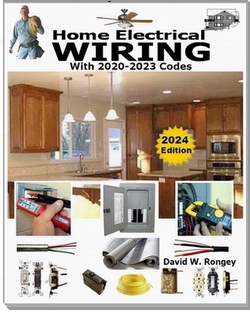Electrical Wiring Codes

|
Summary: Listing of electrical codes for home wiring with examples of electrical home wiring codes for home electrical wiring.
© By: Dave Rongey |
Electrical Codes for Home Electrical Wiring
Electrical Wiring Video
How to Wire a GFCI Outlet without a Ground Wire
CLICK THE IMAGE OR THE LINK BELOW TO PLAY THIS YOUTUBE VIDEO

How to Wire a GFCI Outlet without a Ground Wire
Click Here to Play my Electrical Wiring Videos
Be Sure to Subscribe to my YouTube Channel, Thank You!
Some of the Electrical Codes found on this website are from Code Updates based on previous and current National Electrical Codes
Home Electrical Project Planning
PLAN YOUR WIRING PROJECT
ROUGH-IN INSPECTION
A must be made before insulation, sheet-rock, paneling, or other materials cover any wiring. Underground wiring must be inspected before the trench is back-filled. Except for the final connection to switches, receptacles, and lighting fixtures, all ground wires and other wires in boxes must be spliced and pigtailed for the rough-in inspection.
Code Adoption Information:
The codes shown are examples only and may not be current or accurate for your application or jurisdiction. Contact your local building authority for complete information.Electrical Wiring Inspections
All wiring shall be inspected before it is concealed and the installer shall notify the inspector when the wiring is complete, before the wiring is utilized and the associated space occupied. When an owner files a Request for Electrical Inspection form and inspection fees with the local building department or other electrical inspection authority, that person is signing an affidavit that they own and occupy the residence and that they personally and physically will perform all of the electrical work, including the laying out of such work.
It is illegal for an owner to install electrical wiring in mobile home or recreational vehicle parks, or on property that is rented, leased, or occupied by others.
Electrical Work Generally, most state laws require all electrical work to be performed by licensed, bonded and insured electrical contractors and their employees.
Homeowners
Homeowners, within strict limitations may be exempt from electrical licensing. An owner is a natural person who physically performs electrical work on premises the person owns and actually occupies as a residence or owns and will occupy as a residence upon completion of construction.
Inspectors
Inspectors are usually available by telephone. Call them if you have any questions.
Your local Building Department ________________________________
Inspectors Name / Phone _____________________________________
Local Building Authority _______________________________________
Your local building department may require a separate request for electrical inspection form with the required fees.
Most State Rules:
Equipment Listing and Labeling - All electrical equipment, including luminaires,devices and appliances used as part of or in connection with an electrical installation shall be listed and labeled by a Nationally Recognized Testing Laboratory (NRTL) as having been tested and found suitable for a specific purpose.
Residential Electrical Code Examples for Home wiring
A Partial Residential Electrical Inspection Checklist
State Energy Codes ENERGY CODES - require that all penetrations through an air barrier be sealed so that the interior air barrier is maintained. Sealing applies to all penetrations including the service entrance, conduit, cables, panels, recessed luminaires, electrical boxes, and fan housings.
THE ROUGH-IN INSPECTION
Where wiring is concealed before inspection, the person responsible for concealing the wiring shall be responsible for all costs resulting from uncovering and replacing the covering material.
The FINAL INSPECTION
A final inspection is required where the work is tested and signed off as being completed according to codes that apply in your area. The installer shall schedule a final inspection when the electrical work is completed prior to the wiring being utilized and the space occupied.
This information is intended to be a general overview of residential electrical code requirements. No claim is made that this information is complete or beyond question. Additional information and knowledge is needed to properly install electrical wiring that is essentially free from fire and electric shock hazard.
State and local code requirements may vary. Consult your local jurisdiction building department for complete information.
For assistance, please reference authorized publications based on the most current Electrical Code for your area.
Always contact your local building authority for complete and up to date code information.













